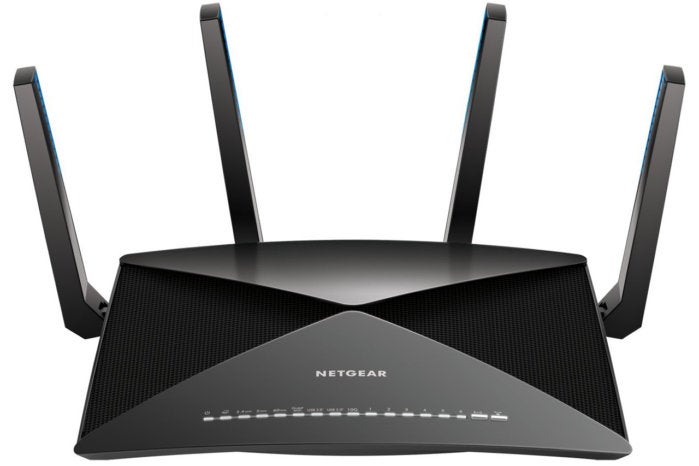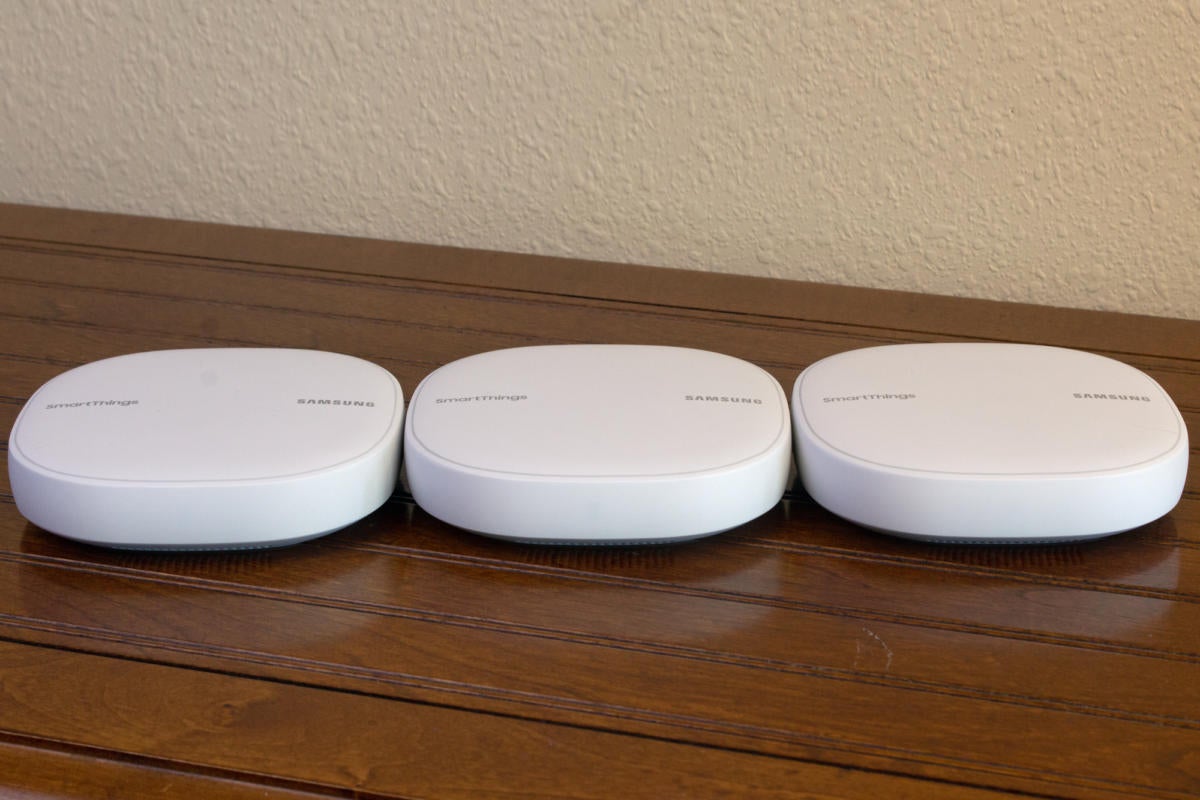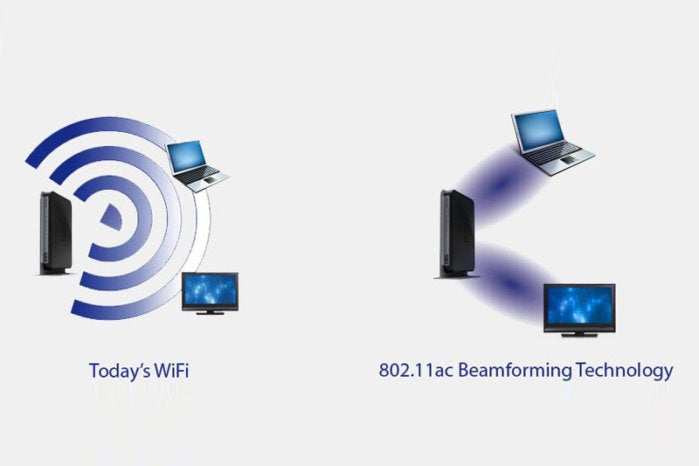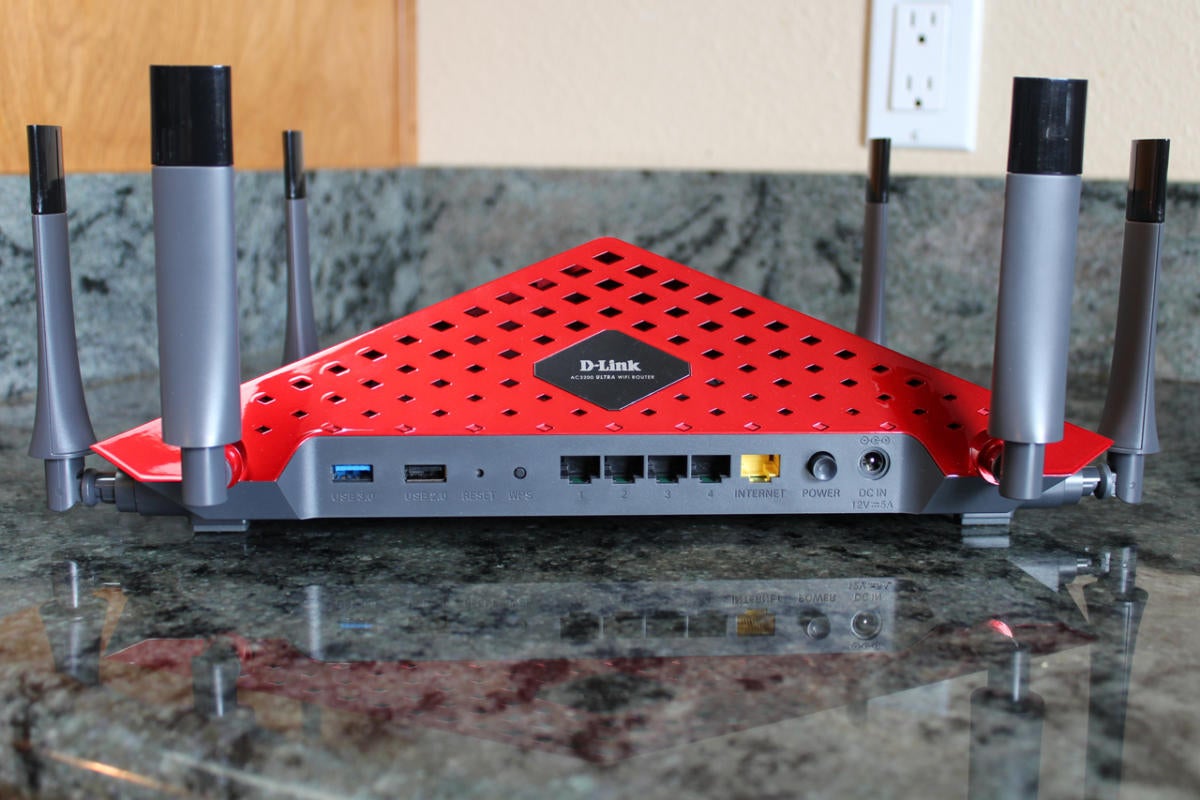A great wireless router is an essential element of tech life, whether you’re building out a smart home or you just want the best experience streaming music and video at home. If you’re suffering with low wireless throughput or dead spots in any area of your home, we heartily recommend deploying a mesh network consisting of a Wi-Fi router with one or more satellite nodes that you sprinkle around your home, because it will blanket your home with coverage.
You can deploy a mesh Wi-Fi router without any satellites, but you’d be losing out on all the coverage benefits that mesh technology provides. We pick the best mesh systems here, because even those of us fortunate enough to have ethernet drops everywhere have devices—smartphones and tablets, for instance—that depend on Wi-Fi to connect to the home network and the internet.
Twin and sometimes conflicting demands for high performance and ease of use are powering a thriving and rapidly evolving market. Innovation is one of the biggest upsides of this dynamic, and confusion its biggest downside. Today’s hero could be tomorrow’s has-been, as established brands like Linksys and Netgear try to one-up each other while simultaneously fending off new challengers such as Eero (now owned by Amazon) and Google. But it’s those challengers who have innovated the most.
Scroll down a bit (or click here) and we’ll discuss the features you should look for in a mesh Wi-Fi system. We’ll also explain some of the jargon you’ll encounter when you shop for one. You can skip to our latest mesh Wi-Fi router reviews by clicking here.
Updated October 11, 2019 to add our in-depth review of the Samsung SmartThings Wifi router. It’s not the most powerful mesh router you can buy, but if you want an easy-to-use smart home hub and don’t need an expensive high-end router, it is a solid value on both scores.
Best mesh Wi-Fi system
The secret to the Orbi RBK50’s success is Netgear’s dedicated 4×4, 1,733Mbps radio used for data backhaul between the router and its satellites (the RBK50 comes with one satellite, which Netgear says is sufficient to blanket 5,000 square feet). We also like the fact that the Orbi router has a built-in three-port ethernet switch (the satellite has a four-port switch), because those ports provide so much flexibility in terms of connecting other devices to your network, be it a NAS box for media streaming and data backup, a network printer that doesn’t support Wi-Fi, or an older ethernet-only A/V receiver in your entertainment center.
An Orbi network can also be expanded with a smart speaker (the Orbi Voice, which supports the Amazon Alexa digital assistant) and a purpose-built outdoor satellite (the Orbi Outdoor). Orbi devices, on the other hand, are among the most expensive mesh Wi-Fi components, and the RBK50 kit in particular is overkill for for smaller spaces.
Runner-up
Like Netgear’s Orbi RBK50 kit, the Linksys Velop is a tri-band router that dedicates one of its three Wi-Fi networks to data backhaul. Unlike Netgear’s offering, however, the Velop dynamically chooses the least-congested channels for that task. On the downside, the Velop’s maximum data backhaul speed is 867Mbps, compared to the Orbi RBK50 kit’s 1,766Mbps. Two Velop nodes proved to be the sweet spot to blanket our 2,800-square-foot test home with Wi-Fi, which would cost $75 less than the three-node kit that we reviewed.
Best budget mesh Wi-Fi system
TP-Link’s Deco M5 is a dual-band Wi-Fi system operating one network using radio spectrum in the 2.4GHz band and a second network using spectrum in the 5GHz band. As such, the Deco M5 must rely on the same bandwidth for data backhaul. And that is the biggest factor that differentiates the Deco M5 from the more-powerful tri-band mesh-network offerings from Linksys and Netgear that use dedicated networks for backhaul. That said, the Deco M5 delivers a ton of value for the money.
Best mesh Wi-Fi system for smart-home enthusiasts
Like the Samsung Connect Home before it, the Samsung SmartThings Wifi isn’t the best mesh router on the market, but it is the best mesh router with an integrated smart home hub. Outfitted with Z-Wave, Zigbee, and Bluetooth radios in addition to Wi-Fi, it can control just about any smart home device you can think of.
Runner-up
TP-Link’s Deco M9 Plus is a better mesh router than Samsung’s Connect Home, but it takes the runner-up spot in this category because it supports only ZigBee smart home devices where Samsung’s device supports both ZigBee and Z-Wave. This is a tri-band system similar to the top-rated Netgear and Linksys offerings that don’t have integrated smart home hubs, and it’s the only one we know of that can steal some bandwidth from its 2.4GHz network for data backhaul. The three-node system TP-Link sent us to review is hard to find, but Amazon sells a two-node kit for $250.
Choosing the right type of router
This guide focuses on mesh Wi-Fi routers because they are the most adept at blanketing a home with wireless coverage. A less-expensive conventional router might be adequate for smaller single-family homes, condos, and apartments if you can place the router near the center of your home. But that can be challenging since the router must be connected to the gateway (e.g., a DSL or cable modem) that provides your broadband access, and those connections are more typically located on a perimeter wall.
Mesh Wi-Fi systems can be divided into two categories: Straightforward routers with one or more wireless satellite nodes that you strategically place around your home, and router/satellite combos that can also operate as smart home hubs. That is, mesh Wi-Fi systems that include the types of radios (e.g., Z-Wave and ZigBee) that can control smart home devices (smart bulbs, switches, thermostats, locks, sensors, and so on).
 Netgear
NetgearHigh-end conventional routers offer high-performance features you won’t find in mesh Wi-Fi systems. The Netgear Nighthawk X10, for instance, has a 10Gbps ethernet port for network storage.
Traditional routers tend to offer more granular control over your network, with tweakable settings for features such as QoS (Quality of Service), port forwarding, VPNs, FTP servers, and much more. Most have built-in ethernet switches (four ports or more), so you can hardwire network devices directly to the router. And they typically have one or two USB ports that can be used to share a printer or USB storage with all the devices on the network. I’d venture to say that most people who buy traditional routers never touch most of those settings or even use many of their advanced features; they buy them because higher-end routers deliver faster Wi-Fi performance.
A dual-purpose router with smart home features will have a ZigBee and/or Z-Wave radio that can communicate with sensors, smart lights, smart entry locks, motorized window shades, and lots of other devices that use the same protocols. Some smart home devices use Bluetooth, but all the routers with Bluetooth radios that we’ve seen so far use that protocol only for initial router setup.
 Michael Brown / IDG
Michael Brown / IDGThe Samsung SmartThings Wifi is the best mesh router system to include integrated smart home features, with Bluetooth, Z-Wave, and Zigbee radios onboard.
Features to consider in a Wi-Fi router
You’ll encounter a thicket of jargon when you shop for a new Wi-Fi router. We’ll explain some of the most common terms you’ll encounter (in alphabetical order).
AP steering A mesh-network router that supports AP steering will automatically direct its wireless clients to connect with whichever access point (AP) offers the strongest connection back to the router (and thus to the internet).
Backhaul The side of a network that carries data packets back to the router and out to the internet. Some tri-band mesh Wi-Fi systems, including the Netgear Orbi and Linksys Velop, dedicate an entire wireless network to backhaul. You can also set up wired backhaul by connecting the access point to the router using an ethernet cable, but that would require drilling holes in your walls and pulling the cable through, a job most people are reluctant to tackle.
Band steering A router with this feature can detect if a client device is dual-band capable (i.e., the client is outfitted with a Wi-Fi adapter that can operate on either the 2.4- or 5GHz frequency bands). The router will automatically push dual-band clients to connect to its least-congested network, which is usually the one operating on the 5GHz frequency band.
Beamforming An optional feature of the 802.11ac Wi-Fi standard that improves wireless bandwidth utilization by focusing the radio signals so that more data reaches the client and less radiates into the atmosphere. Click here for a more in-depth explanation of beamforming.
 Netgear
NetgearA beamforming router knows where its clients are located in physical space and can pack in more data by focusing the radio signals they exchange.
Dual-band vs. tri-band A dual-band Wi-Fi router operates two discrete networks, one on the 2.4GHz frequency band and a second on the less-congested 5GHz frequency band. Some types of tri-band routers split the 5GHz frequency band, using one swath of channels available in 5GHz spectrum to create a second network, and another swath of channels in that spectrum to operate a third network. Other tri-band routers operate discrete networks on the 2.4- and 5GHz bands, and a third network using spectrum available on the 60GHz band, though this technology has fallen out of favor recently.
ethernet ports A router must have at least two hardwired ethernet ports (either 100Mbps or gigabit per second). One (the WAN, or wide area network) connects to your broadband gateway (a cable or DSL modem, for instance). The other (a LAN, or local area network) connects any hardwired client. Some mesh Wi-Fi routers have auto-configuring ports that become WAN or LAN based on what gets plugged into them. You can increase the number of ethernet ports available on your network by plugging an ethernet switch into one of the LAN ports.
Mesh Wi-Fi access points typically have two ethernet ports, so they can serve as a wireless bridge for devices that don’t have their own Wi-Fi adapters. Alternatively, you can use one of the AP’s ports for data backhaul using an ethernet cable that’s connected to your router at the other end.
 Michael Brown/TechHive
Michael Brown/TechHiveHigh-end conventional routers, such as the D-Link DIR-890L, have four-port ethernet switches and USB ports.
Guest network This is a virtual network that gives your guests access to the internet while blocking access to your own computers, NAS boxes, and other network clients.
Hub-and-spoke vs. mesh network In a hub-and-spoke network topology, each wireless access point exchanges data packets directly with the router. A wagon wheel makes for a good visual metaphor here. In a mesh network, wireless access points that are distant from the router can exchange data packets with their closest AP neighbor until the packets reach the router (and vice versa). In this instance, you might visualize a fishing net; or perhaps abstractly, a firefighter’s bucket brigade.
MU-MIMO The acronym stands for multiple user, multiple input/multiple output. MIMO describes a method of sending and receiving more than one data signal using the same radio channel. This is accomplished using a technique known as spatial multiplexing. In its original implementation in routers, client devices had to take turns communicating with the router, round-robin style. The switching happens fast enough that the interruptions are imperceptible, but it reduces the overall transmission speed. This is known as SU-MIMO (single-user MIMO). As you’ve probably guessed, MU-MIMO lets multiple client devices communicate with the router at the same time without interruption, significantly increasing transmission speed. Both the router and the client must support MU-MIMO for the scheme to work.
 Michael Brown/TechHive
Michael Brown/TechHiveA parental controls feature lets you filter the types of content that client device can access from your home network.
Parental controls The internet can be an unpleasant and even dangerous place for children to visit. Router-based parental controls promise some protection by restricting where a person can browse and what they can do while they’re online. Such controls can also restrict the hours that a device is allowed to be online—at least while the device is on that router’s network. Methods and practices—and effectiveness—vary widely. I’ve yet to see a system that’s better than just having an open and frank dialog with your kids, but that’s just my opinion.
Quality of Service (QoS) This concept describes a router’s ability to identify different types of data packets traveling over the network and then assign those packets higher or lower priority. You might want your router to give network traffic such as streaming video or VoIP (Voice over Internet Protocol) calls higher priority than file downloads, for example, because the former don’t tolerate interruptions. Waiting a little longer for a file to download is vastly preferable to watching a glitchy video.
Spatial streams The multiplexed signals described in MU-MIMO above are called spatial streams. The number of radios and antennas in the router determine how many spatial streams it can support; and the method used to encode the data, combined with the channel’s bandwidth, determines how much data can fit within each stream. An 802.11ac router using channels that are 80MHz wide can deliver throughput of roughly 433Mbps per spatial stream. Spatial streams operate in parallel, so adding them is akin to adding lanes on a highway. Where a 2×2 802.11ac router (two spatial streams to transmit and two to receive) can deliver throughput up to 867Mbps, a 4×4 802.11ac router can deliver up to 1,733Mbps. These are theoretical numbers, however; they don’t take into account protocol overhead and other factors, so you’ll never see real-world performance that high.
Wi-Fi speed ratings Vendors commonly market their 802.11ac routers (and 802.11ac Wi-Fi client adapters) by combining the throughput numbers for each of the router’s networks. A dual-band router capable of delivering 400Mbps on the 2.4GHz frequency band and 867Mbps on the 5GHz frequency band might be described as an AC1300 router (rounding up from 1,267, naturally). You’ll never experience 1,300Mbps (or even 1,267Mbps) of throughput, of course, because it’s not possible to bond the 2.4- and 5GHz networks together. But the classifications at least provide a point of comparison.